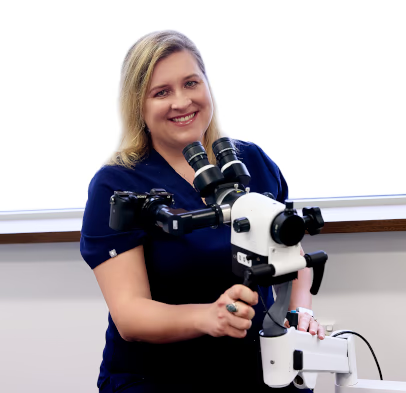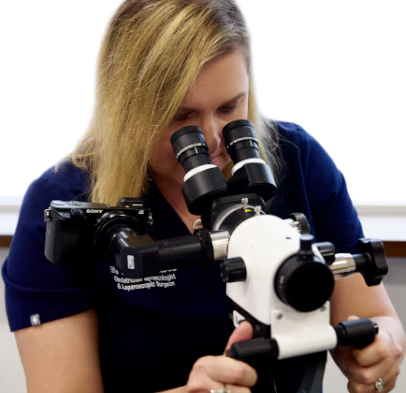Colposcopy
Expert Colposcopy in Sydney by Dr Basia Lowes
If you've been referred for a colposcopy following an abnormal cervical screening test or HPV test, it's normal to have questions. Dr Basia Lowes is a highly experienced gynaecologist in Sydney and advanced laparoscopic surgeon, offering expert, compassionate care in the investigation and management of abnormal cervical screening results.
Dr Lowes takes a thoughtful and evidence-based approach to ensure that each patient receives timely, personalised care.

What is a Colposcopy?
A colposcopy is a specialised procedure used to closely examine the cervix, vagina, and vulva for signs of disease. It is often recommended after abnormal cervical screening tests to determine the presence and severity of abnormal cells.
The procedure is performed in a clinic setting using a colposcope, a lighted, magnifying instrument that allows your gynaecologist to view the cervix in detail. It’s a straightforward procedure that can help detect early signs of cervical dysplasia or cervical cancer.

Image Source: Cancer NSW

Why You Might Need a Colposcopy
Dr Basia Lowes may recommend a colposcopy if there are concerns about changes in the cells of your cervix or unexplained symptoms that require closer examination. Common reasons for a colposcopy include:
- An abnormal cervical screening test result
- A positive test for high-risk HPV (human papillomavirus)
- A previous history of abnormal cervical cells
- Unexplained abnormal vaginal bleeding
It’s important to understand that receiving an abnormal test result does not necessarily mean you have cervical cancer. A colposcopy is an important diagnostic tool that helps guide the next steps in your care, whether that means ongoing monitoring, treatment, or simply reassurance. In most cases, there are minor changes in the cervical cells that can be monitored or treated early, preventing them from developing into something more serious.
What to Expect During the Procedure
Colposcopy appointments typically take around 30 minutes. During the procedure, you’ll lie on an examination table, much like during a cervical screening test. A speculum is inserted to allow visibility of the cervix, and the cervix is viewed through the colposcope. A solution is applied to highlight abnormal cells. If needed, a small biopsy may be taken for further testing.
Dr Lowes ensures that all patients feel informed, comfortable, and supported throughout the procedure. Any findings and next steps are explained clearly and sensitively.
Treatment After Colposcopy
If abnormal cells are detected, Dr Lowes will discuss the most appropriate next steps. Options may include observation with repeat testing, a minor surgical procedure such as LEEP or cone biopsy, or a referral for advanced treatment, if necessary.
As an experienced gynaecological surgeon in Sydney, Dr Lowes also offers minimally invasive procedures for patients requiring further management.
Why Choose Dr Basia Lowes for Colposcopy in Sydney
Dr Basia Lowes is a AGES fellowship-trained advanced laparoscopic surgeon based in Sydney, with extensive experience in colposcopy and gynaecological surgery. She is an experienced Colposcopist and runs a regular Colposcopy Clinic at the Royal Hospital for Women. She is known for her gentle, patient-focused approach, ensuring each patient receives personalised care. Dr Lowes applies an evidence-based approach to cervical health and gynaecological diagnostics, offering the highest standards of clinical practice. Patients also benefit from access to state-of-the-art treatment facilities in some of Sydney’s premier private hospitals if surgery is required.

Book a Colposcopy Appointment in Sydney
If you've been referred for a colposcopy, or if you’re concerned about abnormal cervical screening test results or persistent gynaecological symptoms, we are here to help. Dr Basia Lowes welcomes new patients from across Sydney.
Advanced, Bespoke Surgical Care
Providing expert and holistic care for obstetrics, gynaecology, and women’s health concerns, with a tailored and personalised approach—including conservative, medical, and advanced surgical treatments.

